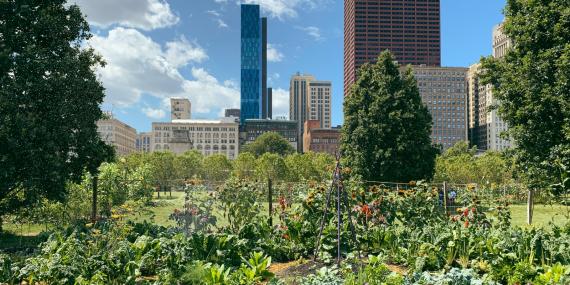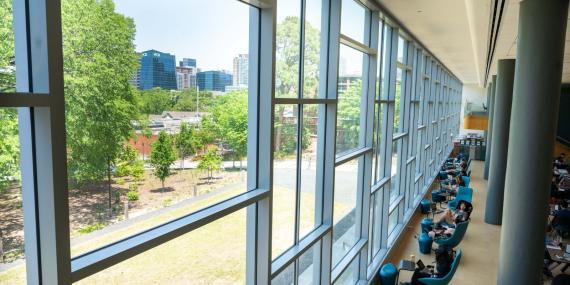Despite advances in technology and artificial intelligence, food security remains a pressing issue in America and around the world.
Experts in the Ivan Allen College of Liberal Arts say building sustainable food systems requires not only scientific breakthroughs but attention to history, policy, and social justice, as well.
“In climate-changed futures, redundancies and multiple scales of action seem resilient to me,” said Heidi Biggs, an assistant professor in the School of Literature, Media, and Communication. “Therefore, one of the most promising innovations in the future of food is local collaborations.”

Reclaiming Ownership of Food Production
Biggs researches technology design and human-computer interaction. Specifically, they study how the U.S. Food and Drug Administration and U.S. Department of Agriculture data rules affect small and mid-sized farmers and how computational agricultural tools can reduce yield disparities for minority and Black farmers.
Biggs explained that food security and production are already unequal — the U.S. overproduces food while people go hungry worldwide — and climate change makes it worse.
While advances in agriculture technology can help, they can also unintentionally cause harm, Biggs said. For example, small and mid-sized farms often can’t afford to adopt new technologies, making competing with large corporations difficult.
“However, climate-smart agriculture and integrating non-Western farming traditions help address this issue,” Biggs said. “And local efforts such as community food activism, seed collecting, and seed libraries can strengthen food security at a smaller scale.”

Supporting Public Research
Helen Anne Curry, Melvin Kranzberg Professor in the History of Technology, echoes Biggs’ concerns.
“The most pressing issue for the future of food is how to resolve profound inequalities in who has access to nutritious, culturally relevant food,” she said.
As a historian in the School of History and Sociology, Curry studies the history of food and crops. She advocates for policies supporting rural communities and measures to strengthen public research institutions that can produce knowledge and technologies for many different users.
“Resolving food insecurity and inequality will not be accomplished by producing more cheap commodity grains or leaving food production in the hands of major multinationals,” Curry said. “We must protect and restore small farmers’ access to land, seeds, and water.”
Charting the Future of Food Through...

Food History
Curry co-edited a special Plants, People, Planet issue on “The History of Crop Science and the Future of Food.”
- Drawing on the 14 research articles in the issue, Curry and co-editor Ryan Nehring at the International Food Policy Research Institute emphasize that politics of empires, nations, research institutions, and academic disciplines have all influenced who is considered a crop scientist, what they study, and the consequences of their research.
- They urge food and agriculture experts to consider how their research interacts with power and politics in shaping the plants that feed the world.

Engineering and Policy
Professor Valerie Thomas holds dual positions in the School of Public Policy and the H. Milton Stewart School of Industrial and Systems Engineering, blending both disciplines in her work. She researches:
The potential for solar-powered irrigation to reduce food insecurity in East Africa
What drives the adoption of water reuse policies
The benefits of food waste reduction
And the environmental impacts of different farming techniques.
(Did you know hydroponic lettuce farming has a greater impact than greenhouse or traditionally grown lettuce?)




